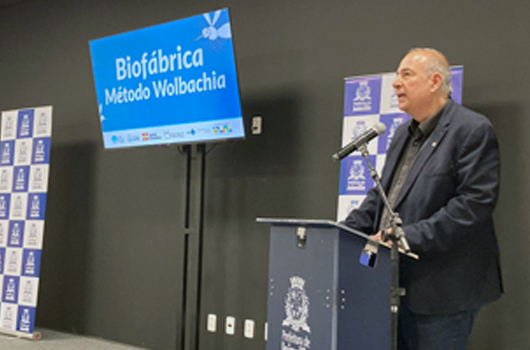Wolbachia Method Biofactory opens in Joinville
09/07/2024
Fiocruz News Agency
At the beginning of July (7/1), the Health Department of Joinville promoted actions related to the implementation of the Wolbachia method in the municipality. The method's strategy consists of introducing the Wolbachia bacterium into Aedes aegypti mosquitoes. A meeting on the project was attended by representatives of the Ministry of Health, Fiocruz and the World Mosquito Program (WMP). The group also made an inspection visit that marked the opening of a Wolbachia Method biofactory.
Krieger said that the cities that adopted Wolbachia Method had fewer cases of dengue (photo: Disclosure)
In addition to Joinville, five other cities are receiving the method: Londrina and Foz do Iguaçu (PR); Uberlândia (MG); Presidente Prudente (SP) and Natal (RN). In previous stages, the method was implemented in the cities of Rio de Janeiro and Niterói (RJ), Campo Grande (MT), Belo Horizonte (MG) and Petrolina (PE). The bacterium, which is present in 60% of insects in nature and does not cause harm to humans, prevents viruses – not only dengue fever, but also Zika, chikungunya and urban yellow fever – from developing in insects, helping to reduce disease. The "wolbitos" will be released in Joinville and will breed with the local Aedes aegypti. Gradually, they will establish a new mosquito population that does not transmit dengue and other diseases.
Fiocruz's vice president of Production and Innovation in Health (VPPIS), Marco Krieger, said at the event that "this is a special day, as we are entering a new phase of an international project with a major contribution from a Fiocruz researcher, Luciano Moreira. Over the last ten years, this project has matured from a scientific and technological point of view and has proved effective in the places where it has been implemented, significantly reducing arboviruses, particularly dengue. This was very clear this year, as Niterói had a proportionally low number of dengue cases compared to Rio de Janeiro. The same happened in Petrolina and Campo Grande, when compared to the surrounding cities. And this project, which was still a proof of concept, has entered a new stage as of today."
The arbovirus control method was developed in Australia and is currently present in more than 20 cities in 14 countries. Moreover, monitoring data shows that wolbitos are establishing themselves at very positive levels in the territories. In Australia, a 96% reduction in dengue cases has been observed.




